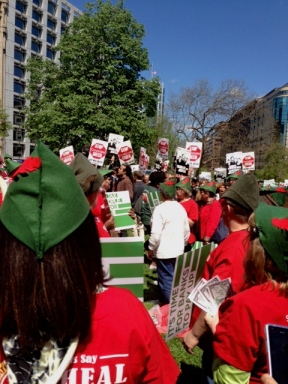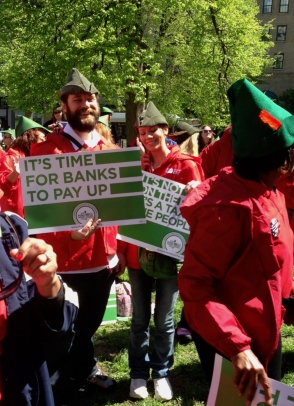By Deborah Burger, RN
Co-President, National Nurses United
This is a huge day,” Rep. Keith Ellison announced April 17 at a press conference within view of the Capitol, referring to legislation he reintroduced for a Wall Street speculation tax with huge purpose.
Take, for example, this passage from the bill’s “Findings.”
“The global crisis cost Americans $19 trillion in lost wealth…. American citizens provided the money to stabilize the financial sector…. The global financial crisis, along with wars, unabated and unaddressed climate change, unsustainable tax cuts, and a continuing unemployment crisis, if unaddressed, will deprive a generation of a meaningful role in the larger economy.” — Inclusive Prosperity Act, H.R. 1579, Sec. 2.

Rep. Ellison addresses Washington press conference April 17 surrounded by supporters of HR 1579
The next step is a big march and rally Saturday, April 20 – 12pm EST @ Rally at Farragut Square – 17th Street NW between K and I streets, Washington, DC.
Then a march follows to the U.S. Treasury Department and White House. Symbolic dollar bills to pay for a real recovery will be delivered to the White House. Anyone not able to attend can watch it via live stream here.
Ellison’s bill is attracting support from more members of Congress — Earl Blumenauer (D-OR), Judy Chu (D-CA), John Conyers (D-MI), Barbara Lee (D-CA), James McGovern (D-MA) and Delegate Eleanor Holmes Norton (D-D.C.).
Calling the legislation “remarkable” and “bold,” Rep. Barbara Lee told the press conference that HR 1579 would address “out-of-control tactics” on Wall Street and would “lead to critical investments for our future — in health and development assistance.”

Rep. Barbara Lee speaking at the press conference
H.R. 1579 would levy a small sales tax on trading of stocks, bonds, derivatives and other instruments. Brokers carrying out the trades would be charged the tax, unless carried out directly by investors. Households with adjusted gross incomes under $75,000 would be exempted.
Indeed, the tax targets the wealthiest of the wealthy, the bankers and brokers who crashed our economy and were rewarded with bailouts and bonuses while Main Street endured the pain. As to those who insist the effects of the tax will just fall on ordinary Americans, consider this: The top 1 percent own half the country’s stocks, bonds and mutual funds. The bottom 50 percent own .5 percent, half of one percent, of all stocks, bonds and mutual funds.
Supporters say the bill would bring real and enduring recovery to Main Street. It also aims to put a brake on high-speed computer trading, avoid bubbles that destabilize markets and sideline capital, and lower costs of essentials, like fuel and food, whose price spikes are linked to speculative trading.
“High-frequency trades are carried out at ‘blinding speeds,'” said Wallace Turbeville, former Goldman Sachs investment banker and a senior fellow at Demos, “to the point where 50, 60 or 70 percent are done by ‘robo-traders.’ This does not give value to the economy, it damages it.”
“Wall Street speculation has become a house of cards, a game of computer-driven bets on bets, far removed from real-world investments in real economic activity,” wrote Ralph Nader in a statement of support for Ellison’s bill.

National Nurses United Co-president Jean Ross at DC press conference
“We have all seen the enormous outpouring of support for a financial transaction tax in this country,” said Jean Ross, RN, co-president of NNU, the nation’s largest nurses’ organization. “The Ellison bill has our strongest support and the backing of millions of members in organizations that endorse Robin Hood – because it would move the country away from austerity, and all the harm that entails, and raise revenue on the scale needed to rebuild the communities still suffering from the financial collapse of 2008.”
George Goehl, executive director, National People’s Action, thanked Rep. Ellison for his “courage” and for pushing back against “awful austerity.” Goehl said that polls indicate that 62 percent of the public support an FTT. “We have a revenue crisis in America,” said Goehl, “but the good news is that we know where the money is. It’s not in grandma’s social security check, it’s not in our children’s classroom, and it’s not in the pockets of working class families. It’s on Wall Street.”
“The United States has made a commitment to invest in the end of AIDS. Yet, with our current budget crisis this will be impossible, unless we join all of the other major financial markets and implement a Robin Hood Tax. There is no reason not to do this,” said Jennifer Flynn of Health GAP. “It’s common sense legislation.”
Erich Pica, of Friends of the Earth, also spoke, expressing support for Ellison’s bill in behalf of his organization’s 150,000 members and its goal to address “uncontrolled climate change.” He asked, “Does the U.S. have the political will for adaptation that has to occur?”
“We have an FTT at the gates of Congress,” said Bobby Tolbert of VOCAL-NY. “With a tiny tax on Big Banks, we can invest in our future by creating jobs, protecting healthcare and solving crises like the HIV/AIDS epidemic and climate change. It’s the minimal endowment owed by corporate America.”
More than 140 organizations representing millions of members in labor unions, religious groups, as well as health advocates, consumers, housing activists, environmentalists, and others have endorsed the passage of the Wall Street sales tax. Among those showing their support this week were the Sierra Club and the National Organization for Women.
“It’s about time Wall Street started paying its fair share,” said NOW President Terry O’Neill. “The people of this country are still struggling to get by, six years after the economic downturn began. Women are disproportionately represented amongst the poor and those working for minimum wage with little to no benefits. We need a strong safety net, and who better to pay for it than the financial institutions that caused the economic crisis in the first place?”
Ellison noted that the idea of the tax is not outlandish or unusual, calling it, in fact, “mainstream.” Today, dozens of countries have in place a system of financial transaction taxation, including many of the world’s biggest economies. Eleven European countries, including Germany, France and Italy, have either implemented or will soon implement an FTT.
The leading Asian financial markets also charge these taxes as do other major economies with the exception of the U.S. But even the U.S. had a tax for half of the last century until the increasingly powerful financial industry lobby succeeded in having it repealed in the 1960s.
“The Inclusive Prosperity Act, which establishes a modest tax on virtually all financial transactions in the United States, is a hugely important policy initiative that addresses three of our most important economic problems today–austerity, financial instability, and inequality,” said University of Massachusetts-Amherst economist Robert Pollin.
“This measure is capable of generating in the range of $300 billion per year in tax revenues. These funds would enable us to fight against the austerity-agenda cuts to Social Security, Medicare, public education and other vital social programs. The Act will also discourage excessive speculation in financial markets, by increasing the costs of Wall Street gambling. Everyone shopping on Main Street today pays sales taxes when they buy things. It’s time for Wall Street traders to face up to similar obligations.”
Follow Deborah Burger on Twitter: www.twitter.com/NationalNurses


![MNA members gather after the Robin Hood Tax Rally photo[1] copy 4](http://mnnurses.files.wordpress.com/2013/04/photo1-copy-4.jpg?w=294&h=182)



